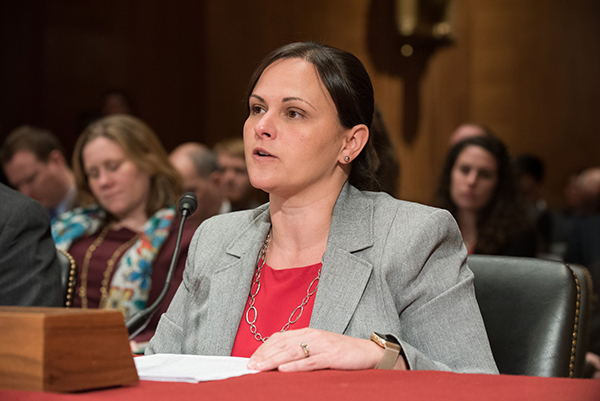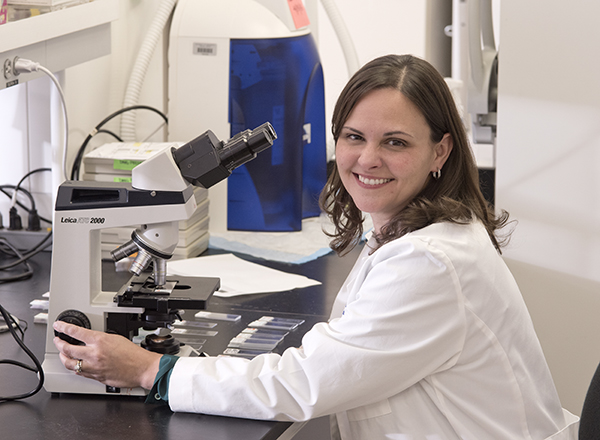Dr. Sasser goes to Washington

Published in News Stories on March 13, 2017
Most Americans communicate with their representatives through emails, voice mails or tweets. A University of Mississippi Medical Center faculty member talked to hers - and several others - face-to-face in Washington, D.C.
Dr. Jennifer Sasser, assistant professor of pharmacology and toxicology, testified to the Senate Labor, Health and Human Services, and Education Appropriations Subcommittee March 8. The hearing, “Saving Lives through Medical Research,” included Sasser and three other researchers who addressed the importance of federal funding for medical research.
“This steady support is critical to my future, the future of my students and research assistants and, most importantly, to countless people who will receive better care due to the work funded by [the National Institutes of Health],” she said.

Sasser research involves testing sildenafil (sold commercially as Viagra) as a treatment for preeclampsia.
Sasser studies preeclampsia, a pregnancy-related disease characterized by high blood pressure. Her lab is examining ways to treat the condition and why preeclamptic women have a higher risk of heart attack, stroke and kidney disease after pregnancy.
It's a condition with particular relevance for Mississippi.
“Mississippi mothers are 10 to 20 times more likely to have preeclampsia than the national average," Sasser said. "This not only endangers these mothers . . . but puts the lives and futures of these newborns at risk from the very start.”
U.S. Sen. Thad Cochran of Mississippi, chair of the Senate Appropriations Committee, attended the hearing. He “sought to emphasize the importance of making federal resources available to medical research institutions,” according to a news release from the Cochran's office.
According to the release, “The University of Mississippi Medical Center is an example of a research institution competing successfully for Institutional Development Award funds to build research capacity and combat health disparities in states like Mississippi.”
Known as IDeA, the “program is intended to level the playing field for states that traditionally have not received large amounts of funding from NIH,” said Dr. Richard Summers, associate vice chancellor for research.
“The problem has always been that it takes substantial grant funding to build a program in which young investigators can develop to become independently funded,” Summers said. “[These] programs provide a localized jumpstart for promising young investigators in these states.
"We have been successfully using this funding mechanism to grow our own future research scientists here at UMMC.”

Sasser, far left, was part of a select group who testified in front of the Senate Labor, Health and Human Services, and Education Appropriations Subcommittee.
In her testimony, Sasser noted the importance of the IDeA program and other NIH resources to her development as a scientist.
“I credit these programs for kick-starting my career and giving me the stability and confidence to pursue a lifetime of work in medical research,” she said.
Now, Sasser is training the next generation of scientists. In addition to serving as director of UMMC's medical pharmacology Ph.D. program, she has her first R01 grant from the NIH. These awards, which fund specific research projects, are "the 'gold standard' grant mechanism for highly competitive research programs,” Sasser said.
“With this new award, I will be able to grow my laboratory to support two additional Ph.D. students and one or two research assistants, increasing both the number of trainees who will go on to develop their own biomedical innovations and the number of high-quality jobs for Mississippians,” she said.
Sasser learned in February that Summers had nominated her to speak on behalf of UMMC's biomedical researchers. The Medical Center's Government Relations Office helped prepare her for her trip to Washington and her testimony.
“I was honored to be considered,” she said. “I was able to be a voice in the Senate and reinforce exactly why medical research is important to improve the health of Americans.”
Read Sasser's written testimony here and view her response to a question here.


